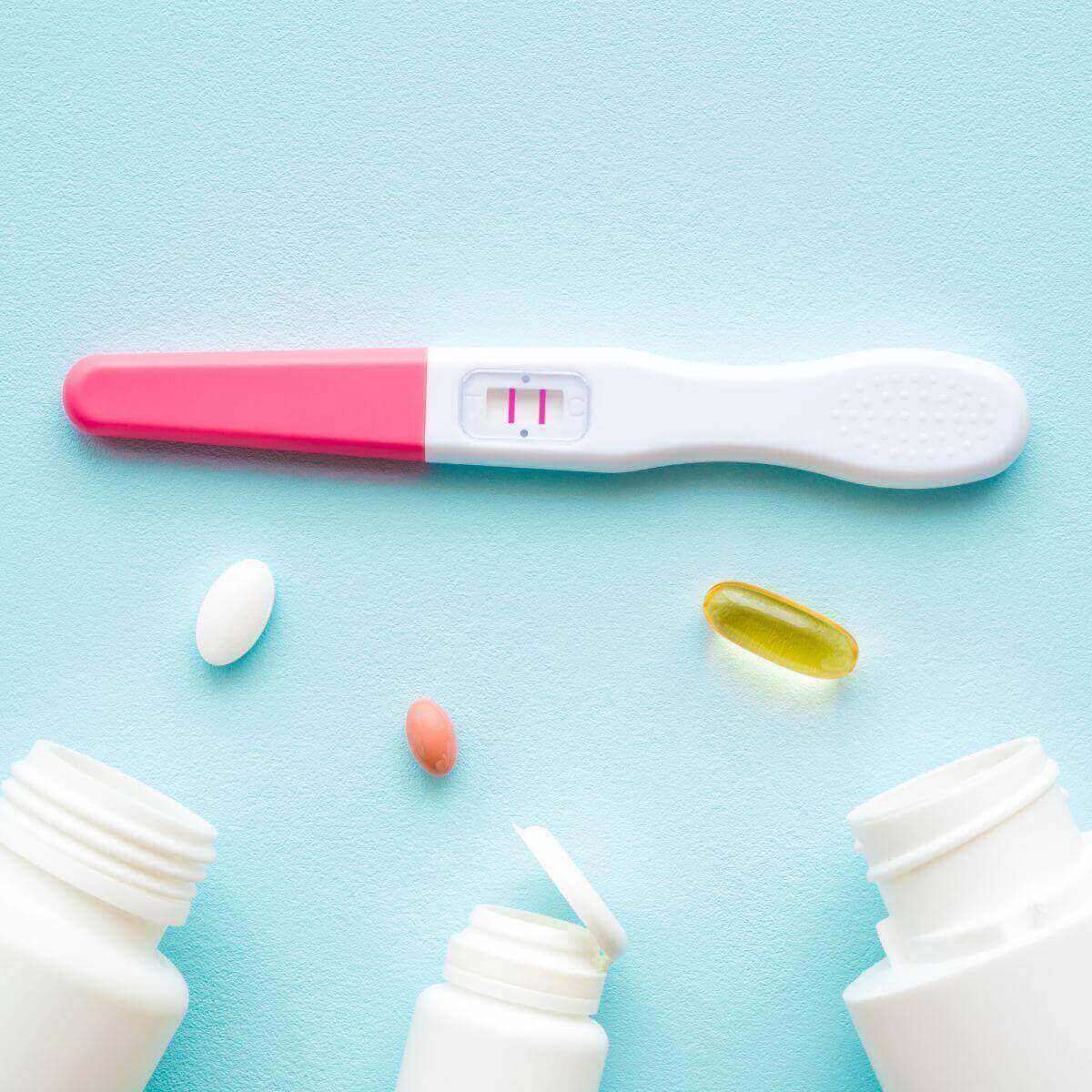Do you remember when you were a kid and the extent of your vitamin regimen involved a chalky chewable that resembled a cartoon caveman from the 1960s? Unfortunately, choosing your prenatals isn’t as easy as popping your morning Flintstone vitamins. So how do you choose the best prenatal vitamins for pregnancy and trying to conceive?
Here’s what I’ve learned: there are A LOT of prenatals on the market. Whether shopping at the local Target, natural grocery store, an Amazon storefront, or even scrolling social media if the Metabots have figured out you’re interested in having a baby, you’ll notice an insane array of prenatal vitamins out there who all insist they’re the BEST!
It can feel really impossible–not to mention overwhelming–to know which one is right for you.
Do you throw a rock down the aisle and see where it lands? Cover your eyes, turn in circles, and point?
Sure, you could do that, but I wouldn’t recommend it.
To ensure you’re getting everything you and your baby need during pregnancy, it’s important to consider the critical nutrients in your prenatal vitamin. Spoiler alert: not all prenatal vitamins for pregnancy are considered equal, and what’s best for your body may not actually be best for someone else’s. No worries, though, friend; we’ve got you covered.
Keep reading to learn all the things to take into consideration and questions to ask when talking to your doctor about which prenatal vitamin is right for you!

This site contains affiliate links, meaning that we earn a small commission for purchases made through our site. We only recommend products we personally use, love, or have thoroughly vetted.
- Why Is It Important to Take Prenatal Vitamins During Pregnancy?
- What’s Different About Prenatal Vitamins? Ingredients You Need to Know About
- Things to Consider When Picking Your Prenatal Vitamins for Pregnancy
- What’s the Best Prenatal Vitamin for Pregnancy Available? Here Are Our Top Picks!
- 1. The Best Prenatal Vitamin of 2023: Natalist
- 3. Our Favorite Prenatal at Target: Thorne Basic Prenatal
- 4. Shopping for Prenatal Vitamins on Amazon: Ritual
- 5. The Most Popular Prenatal Gummy Vitamin: SmartyPants Prenatal Formula
- 6. Our Preferred Budget-Friendly Prenatal Vitamin: NatureMade Prenatal with Folic Acid & DHA
- So, What’s the Best Prenatal Vitamin for You?
Why Is It Important to Take Prenatal Vitamins During Pregnancy?
Truth time: I hate taking vitamins, and I am terrible at doing so. I buy them with great intentions, but they usually become cabinet trinkets until they expire and I have to throw them away.
Except for when I was taking prenatals, that is.
Something about skipping my daily prenatal vitamin gave me a lot of anxiety. My pregnancies were probably the only time in my life that I stuck to my supplement regimen.
Prenatal vitamins come packed with essential ingredients to meet daily nutritional value requirements during pregnancy. Without these supplements, your baby could be at risk of neural tube defects, spinal cord issues, or other developmental problems. Prenatals also boost iron levels and promote essential blood flow to your uterus and baby.
You and your baby will also receive added benefits from Vitamin D, Vitamin C, zinc, and calcium necessary for your little one’s development.
Many changes are happening in your body during pregnancy. A trusted prenatal vitamin ensures you receive the nutrition needed to support those developments.
Are There Benefits of Prenatal Vitamins While Not Pregnant?
Do you need to take prenatal vitamins if you’re not pregnant? Only if you’re trying to conceive (keep reading!) or breastfeeding.
Can you take them, though? Sure, if you want to.
While a standard multivitamin will work fine when you’re not expecting, it shouldn’t hurt to continue or start a prenatal regimen, but make sure you talk to your doctor about doing so.
Should You Start Taking Prenatals While TTC?
When you’re actively trying to conceive, it’s recommended that you start taking prenatals right away. Most health professionals will recommend that you take a prenatal for at least 3 months before conceiving, if possible.
Of course, it’s impossible to know how quickly you might conceive when you begin trying, so it doesn’t hurt to start taking them a couple months before you are actively trying!
Don’t worry if you weren’t taking prenatals prior to getting pregnant–trust us, you aren’t the first and you won’t be the last! Just start taking your prenatal vitamins as soon as you can.
By starting your prenatal now, you can assure your baby is receiving a good dose of supplements needed for their development during the first trimester.

What’s Different About Prenatal Vitamins? Ingredients You Need to Know About
Take a deep breath and prepare your brain for a little scientific mumbo jumbo; it’s time to start talking about the essential ingredients in prenatal vitamins.
First, you might wonder whether sticking to your usual multivitamin is an option. Most of us can probably agree we’d rather not buy something different if we don’t have to.
Please hear us when we say that actual prenatal vitamins (not your regular multivitamin) are a must-have pregnancy essential.
There are certain minerals and nutrients our bodies and babies need throughout pregnancy. The standard multivitamin doesn’t usually include those things.
As you search for the best prenatal vitamins, consider these vital ingredients before picking.
1. Calcium
Pregnant bodies need 1,200 milligrams (MG) of calcium daily during pregnancy.
We always recommend adjusting your diet when possible to improve your intake of different vitamins and nutrients, as they tend to be more bioavailable (meaning your body processes them better) in food than in supplement form. For calcium, try to incorporate foods like yogurt, cheese, and leafy greens, but since the average calcium intake among pregnant people is often low, your prenatal multivitamin will help make up the difference.
Calcium will help strengthen your little one’s developing bones and teeth and enhance the development of their tiny hearts and nerves*
It’s not just your baby that will reap the benefits of calcium, though.
While we’re busy baking our babies, there’s a rare chance we could develop pregnancy-related osteoporosis. Calcium will give our bones the boost they need to avoid this disorder.*
Getting enough calcium is also an excellent way to help prevent preeclampsia during pregnancy.*
2. Omega 3 (DHA and EPA)
Among Omega 3 supplements, DHA is critically important during pregnancy. That said, there are also benefits to taking a prenatal that includes EPA, which is a marine version of omega-3 usually found in fish.
Omega 3’s, especially DHA, are integral to your baby’s neurological and visual development.* For mamas, they also support the development of hormones called prostaglandins that prevent blood clots, improve blood pressure, and reduce inflammation and allergy responses–all extremely important while you’re working hard to help your baby grow.*
Taking plenty of DHA (at least 300mg daily) also benefits your overall pregnancy experience. When you get plenty of Omega 3’s, you’ll have a lower risk of preterm delivery, low birth weight, and preeclampsia.*
Researchers also suggest that taking enough DHA decreases the chances of depression during pregnancy and postpartum mental health issues.*
3. Folate/Folic Acid
Ahhh, folate (aka B vitamins)–a necessary yet confusing and sometimes controversial dietary supplement. While pregnant, our bodies need folic acid daily to help prevent neural tube defects that affect our baby’s brain and spinal cord development.*
To put it simply, folic acid/folate (no, they aren’t exactly the same; we’ll get there) is one of the most crucial vitamins you need throughout pregnancy.
So, what could be so controversial about a vitamin we know is important?
It all comes down to how we’re receiving our daily folate intake. There are different forms of this substance found in prenatal vitamins. You might think one is as good as the other, but that isn’t always true.
Check out the information below to learn about the difference between folic acid and methylated folate.
Folic Acid vs Methylated Folate
Folic acid is a synthetic form of folate; in simpler terms, you won’t find it in the natural world. It’s also the folate type most frequently found in many prenatal vitamins.
But is it a good option for everyone? Possibly not.
Is it the best option for some? Absolutely!
Let us explain.
To reap the benefits of folic acid, we rely on our liver to do some heavy lifting. Before the substance can be absorbed into our systems, you must convert the synthetic folate into methylated folate (the naturally occurring alternative).
Most of the time that isn’t a problem. Here’s the thing, though. According to the scientists we trust at SNP Therapeutics:
“There are several genes that regulate the metabolism of folate within the folate cycle. Every person has two copies of each gene, one from each parent. The MTHFR and MTHD1 genes give instructions for transforming folate into methyltetrahydrofolate and other forms usable by the body. When one or both copies of these genes has a mutation, less usable folate passes to your growing fetus to prevent neural tube defects and build DNA.”
In the United States, up to 60% of people have a genetic variant on one copy of this gene, and about 25% have a heterozygous mutation, meaning there’s a variant on both copies of the gene.
Consequences of the MTHFR Variant
Let’s go back to our scientist buddies for a minute:
“A potential consequence of an MTHFR mutation is an accumulation of homocysteine. When combined with low folate levels, this can lead to miscarriage, preeclampsia, and congenital disabilities of the brain and spine.”
If you have the MTHFR mutation, you’ll want to ask your doctor about taking methylated folate. According to SNP Therapeutics: “Most people with MTHFR mutations absorb sufficient folic acid to prevent neural tube defects in their babies. However, some studies show that supplementation with methyl folate is preferred for those with the MTHFR mutation.”
This is admittedly controversial, as the American Congress of Obstetrics & Gynecology specifically recommends folic acid to prevent neural tube defects because that is what’s been tested and proven. Also, if you absorb it well, folic acid is significantly less expensive than methylated folate, making your prenatal vitamins cheaper.
That’s why we suggest an honest chat with your doctor before settling on any prenatal vitamin regimen that you plan to stick with for the long haul.
Curious about how to tell if you have the MTHFR variant? There’s an excellent prenatal nutrition test we highly recommend called The Genate Test, a simple at-home cheek swab you can use to learn more about how your body processes various vitamins and supplements.
You can read more about this amazing test in our super honest Genate Test Review, but just so you know, it tells you about a lot more than just your folic acid/folate needs, and it’s pretty game-changing for understanding your personalized nutritional needs for TTC, pregnancy, and breastfeeding.
4. Iodine
You’ll want to make sure you’re getting enough iodine during pregnancy, at least 220 micrograms a day, to be exact.
Iodine supports the production of thyroid hormones in moms and babies and plays a significant role in our little one’s brain development.* In fact, research shows that babies who received higher levels of iodine during pregnancy have a higher IQ when they reach school age.*
5. Iron
Anemia is a common risk factor during pregnancy; approximately 15-25% of expecting people are also iron deficient.
Low iron during pregnancy can cause many prenatal problems, including fatigue, premature birth, low birth weight, and maternal mortality. You should get at least 27mg of iron daily to avoid these.
Adding plenty of iron-rich foods to your pregnancy diet, such as red meat, seafood, whole wheat, beans, and leafy green vegetables, is also a good idea.
6. Vitamin D
Vitamin D is crucial to baby development as it supports their bones, teeth, heart, kidneys, and nervous systems.* The hard part is most prenatal vitamins only have 400 IUs of the supplement when many experts believe we should be taking up to 4000 IUs.
If your prenatal doesn’t have that much Vitamin D, you might want to add an extra Vitamin D supplement while pregnant.
And don’t forget, getting outside in the sunshine is another excellent way to relieve pregnancy stress and get some extra Vitamin D!
7. Choline
Choline, a nutrient found in egg yolks, poultry, and cruciferous vegetables, is vital to the development of baby’s brain and contributes to the development of their attention span.
It’s also noticeably absent from many popular prenatal vitamins.
A recent Cornell study discovered that not only is the current recommendation of choline intake (450mg) not enough, but up to 90% of pregnant folks aren’t even getting that much.
Many of us depend on our prenatals to provide the supplements we need for ourselves and our babies during pregnancy. Unfortunately, we don’t always seek more vitamins if our chosen prenatal doesn’t have enough of something.
It’s essential to reach your daily intake goals of choline.
When I took the Genate Test, I discovered that I have multiple blocks in the pathways that help me process choline, especially the kind that comes from animals. I need significantly more than is recommended, and most prenatals don’t contain even the recommended amount, so for me, supplementing with additional choline (and eating lots of eggs) is essential.
Try to find a prenatal vitamin that includes it, or consider a supplement to make up the difference.
Things to Consider When Picking Your Prenatal Vitamins for Pregnancy
Aside from scanning the ingredient list to ensure your prenatal has the recommended nutrients listed above, you should think about a few other things before picking the best prenatal vitamin for your pregnancy, such as:
- Talk to Your Doctor: Many ob/gyns will offer suggestions about reliable prenatal vitamins. It’s always a good idea to do your research, too, but getting advice from your healthcare provider should always be your first step.
- Think About Your Budget: Prenatal vitamins can get pricey. When you’re budgeting for a baby, be sure to consider how much you can spend on them before choosing.
- Consider Third-Party Testing Requirements: Look at whether your chosen supplement has undergone certification from organizations like NSF or USP. This indicates that your chosen prenatal has a trusted seal of approval. If it doesn’t, however, that doesn’t mean it’s automatically a “bad” vitamin. These certifications cost LOTS of money. Many smaller companies go through another 3rd party testing site that’s just as efficient and dependable.
- Find Out if They Include Bioavailable Ingredients: As we said with methylated folate, sometimes naturally-occurring supplements are easier for our bodies to process. The Genate Test is a great way to determine whether these ingredients are better for your unique nutritional needs during pregnancy.
- Evaluate Dosage Requirements: Can you only remember one vitamin daily? Would you be okay taking a prenatal vitamin regimen that required five pills daily? Think about your vitamin-taking habits and consider what dosage you’re capable of taking.
- Always Choose GMP-Certified Vitamins: GMP-Certification (Good Manufacturing Practices) is a MUST FIND regarding prenatal vitamins. This means they are produced in an FDA-approved facility.
What’s the Best Prenatal Vitamin for Pregnancy Available? Here Are Our Top Picks!
Now that we have these expansive stats about prenatal vitamin benefits and which ingredients to look for, it’s time to apply our new knowledge. It’s the moment we answer the question: “What’s the best prenatal vitamin for pregnant mamas?“
We’re here to tell you that more than one great option exists–in fact, there are several trustworthy products available, and we love choosing based on your personal needs.
While we definitely have our personal favorites (cough, Natalist, cough!), the prenatal vitamins listed below are all top contenders.
A quick note first, though. Not a single one of these recommendations contains the needed daily amount of choline. No matter what prenatal vitamin you choose, we recommend talking to your doctor about supplementing with extra choline, or adding a few eggs to your daily meal plan. (One large egg contains 164mg of choline.)
1. The Best Prenatal Vitamin of 2023: Natalist
If you want to take the cream of the prenatal vitamin crop, Natalist is our top choice. This GMP-certified company creates a plant-based prenatal that goes above and beyond testing standards. Not only do they analyze all of their raw ingredients, but they also test EACH batch of final products.
They’re also extremely transparent with the information they provide customers on their website, which isn’t typical in the supplement world.
One downfall is you have to take five pills a day with this regimen, which isn’t everyone’s favorite thing to do. They do have a yummy prenatal gummy vitamin alternative, though.
Not sure where to buy Natalist prenatal vitamins? You’re in luck–not only can you purchase them on Amazon, but they’re also available at Target, CVS, and Whole Foods.
The biggest shortcoming of this prenatal vitamin is its Choline content.
2. The Top Prenatal Vitamin on Amazon: Garden of Life Vitamin Code Raw Prenatal
If you’re shopping for a high-quality prenatal vitamin on Amazon, Garden of Life’s Vitamin Code Raw Prenatal is an excellent option. Several of my friends have taken this and had great experiences with it.
Not only does it include bioavailable folate to benefit anyone with the MTHFR mutation, but it’s also compounded with many other crucial pregnancy supplements, such as Vitamin D, iron, and a popular probiotic blend to help with any annoying pregnancy tummy troubles.*
It also contains ginger extract to help alleviate your morning sickness symptoms.*
Allow me to continue raving about Garden of Life, though–it’s also a non-gmo multivitamin, gluten-free, and NSF-certified, making it a reliable option if you’re shopping for prenatals on Amazon.
Note: This vitamin doesn’t contain choline, so you should purchase an additional supplement to receive the crucial benefit of choline.
3. Our Favorite Prenatal at Target: Thorne Basic Prenatal
We all love an excuse to go to Target, so why not put your prenatal vitamins on the shopping list, too? And when you do, you’ll have access to Thorne Basic Prenatal Vitamins– one of the best options currently on the market.
It might surprise you that not every popular prenatal meets FTC/FDA regulatory requirements–Thorne does, though!
To ensure their customers receive the highest quality prenatal vitamins possible, Thorne puts their prenatals through an unprecedented four rounds of testing, including raw material testing, in-process testing, finished product testing & stability testing. Their vitamins also include methylated folate and choline, which we’ve learned isn’t always a given with prenatal vitamins for pregnancy.
You’ll still want to supplement with additional choline, though.
Warning, though: some reviewers compare this prenatal to a horse pill in size (and you have to take three a day). If your morning sickness makes it hard to swallow vitamins, these might not be the best choice.
4. Shopping for Prenatal Vitamins on Amazon: Ritual
If you’re on social media, you’ve probably seen ads for those pretty golden vitamins people are losing their minds over. That’s Ritual–one of the best prenatal vitamins on Amazon!
While Amazon has many exceptional prenatal options, Ritual definitely warrants a mention.
These capsules contain almost all the essential nutrients you and your baby need during pregnancy. They’re also sugar-free, dairy-free, and vegan. I also love that they’re formulated with a delayed-release inner capsule that helps you absorb as much of the supplement’s ingredients as possible.
Reviewers mention that they come with a lemony flavor and smell, making them easier to swallow. However, this prenatal doesn’t include calcium, so an added calcium supplement is a must.
5. The Most Popular Prenatal Gummy Vitamin: SmartyPants Prenatal Formula
When it comes to taking prenatal vitamins, some people like to poopoo the idea of gummies. While some experts argue that they are less potent over time because they aren’t as shelf stable, they’re still much better than taking nothing at all, especially when you’re dealing with pregnancy nausea and can barely keep anything down!
So, if you choose gummy prenatals, your best bet is the Prenatal Formula by SmartyPants.
This prenatal vitamin is on Amazon and has almost 23,000 reviews. It includes all essential pregnancy nutrients, including Omega-3, folate, choline, and iodine.
Many reviewers also mention that the formula is gentle enough to take on an empty stomach.
6. Our Preferred Budget-Friendly Prenatal Vitamin: NatureMade Prenatal with Folic Acid & DHA
We’ve listed some of the best prenatal vitamins for pregnancy on the market. You’re in safe hands if you pick any one of them.
The only downfall is that a lot of them are pretty cost-prohibitive.
Not everyone has the extra money to spend tons on prenatal vitamins. Luckily, though, plenty of low-cost alternatives, such as Nature Made’s prenatal with folic acid and DHA, are still excellent.
These prenatal vitamins are widely available at stores like Target, Amazon, and Rite Aid, so you’ll have easy access to them anytime you’re running low!

So, What’s the Best Prenatal Vitamin for You?
So what have we learned? That it’s not hard to find a prenatal vitamin that offers everything you and your little one need throughout your pregnancy journey!
The only tricky part is narrowing down the incredible options listed above according to your budget and what your body can process.
Take your time; do your research, and ask your healthcare provider if you have questions about which prenatal vitamins are best during pregnancy. Sometimes it takes trial and error to determine which product is right for your specific needs, but give it some time, and you’ll get there.
Which prenatal vitamins for pregnancy did you take? Would you use them again in the future?
















